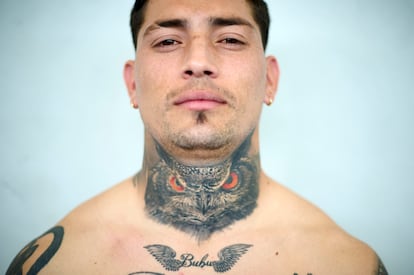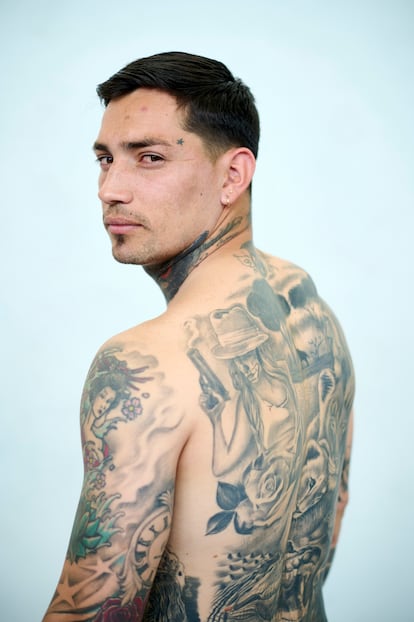Chimy Ávila: ‘Anyone can wear a suit and tie, but not just anyone can live in certain neighborhoods’
Ahead of the Spanish Cup final against Real Madrid, the Osasuna striker talks to EL PAÍS about his humble origins in Rosario, prison and his faith


Ezequiel “Chimy” Ávila points to an Osasuna youth player in the gym at the Liga club’s training complex: “Look, life is like a punching bag: you’re always going to get hit, so you try to take as few as possible.” He has received plenty, but he says he feels lucky because, after all, none of those stray bullets that used to fly through his neighborhood in Rosario, Argentina, ever hit him. God, he says, saved him. Soccer also helped keep him away from crime, although he has faced other obstacles. Two thick scars run up and down his knees, the umpteenth challenge of a life chiseled out of faith. “That’s what it’s all about, believing: falling down and getting up again, falling down and getting up, falling down and getting up...” he says softly under the midday sun in Pamplona, a day before the Spanish Copa del Rey final where Osasuna face Real Madrid on May 6. On the pitch, it’s a very different story: Chimy is a firebrand, known as “El Comandante.”
Question. Which is more difficult to dodge, defenses or bullets?
Answer. There are defenders who hit and know how to hit, but the percentage of bullets that hit you before you stop counting, as they say in Argentina, is very high. It is easier to dodge a defender who you know he is coming at you; not with the intention of hurting you, but to hit you. When it comes to bullets, either they have some effect on you or you’re not going to be saved.
Q. How many have you had to avoid?
A. I don’t know if I should call it avoiding, maybe it’s more to do with luck, fate. In the neighborhood, at any moment a shootout could break out and more than dodging a bullet, it was more about who got hit and who didn’t. I have been in many shootouts and gang fights and got caught in the middle, but fortunately I was saved, because God always gave me the sacred mantle; unfortunately, many friends and schoolmates did not have the same luck and they did get hit.
Q. Do you consider yourself privileged?
A. Yes, every night and every morning I thank God for being where I am and for making a living from what I love. Beyond the obstacles I have faced, he always gave me the strength to overcome them and I am privileged not to be the one lying on the floor spilling blood.
Q. What would you have become without soccer?
A. I owe a lot to soccer, to God and to my family, who were always by my side to keep me from going off the rails. I don’t know if I would be in jail, if I would be working with my father [a bricklayer] or if I would be dead. It’s the law of the neighborhood.
Q. What comes to mind when you think of your neighborhood, Empalme Graneros?
A. I see myself taking penalties at dawn, running around happily on the little playing field, the smell of barbecue and music. It was a happy neighborhood that I still miss a lot.
Q. That mixture of violence and happiness seems like a clash. How do you explain the relationship between those emotions?
A. I wish I could do a lot of things for those people, but sometimes you have to do them from afar. It wasn’t always all negative or dangerous stuff; There were nights of happiness, games that I’ve carried with me... And now I am about to play a cup final against Real Madrid.
Q. Zlatan Ibrahimovic said: “You can leave Rosengard [the AC Milan forward’s neighborhood in Sweden], but Rosengard will never leave you.” Does the same apply to you?
A. Look [he points to his arm], I’m getting goose bumps... Because I have another very similar phrase. I always say, ‘You can take a street out of the world, but you can’t take the world out of the street.’ That’s the way it is. It’s nice to talk about the neighborhood, but you have to see the reality; it happened with my neighborhood and many others in Argentina. They can build a hospital that looks beautiful from the outside, but with tinted windows you don’t know if there are stretchers or oxygen inside. Stay there for a week or two, and then you will know what the reality is. I don’t understand politics and I don’t like to talk about it, but I will always defend what’s mine, my people; anyone can wear a suit and tie, but not just anyone can live in certain neighborhoods.

Q. When you’re on the pitch, you have this permanent tic, constantly looking around you. Is it instinctive?
A. He doesn’t like me naming him, but I’m going to do it anyway. The first person who discovered it was my physio, Jurdan [Mendigutxia]. We spent many hours together and he spotted it. Wherever I am, I remember things and faces, and I’m always watching what’s going on around me; I’m talking to you, but right now I know what’s going on around us and who’s watching us. It’s something that I’ve had since I was a kid. I look like an owl!
Q. Does your father still work in construction?
A. Both my brother [a professional soccer player in Belgium] and I want to help him out, but he is very independent and doesn’t want money. He says that, as long as his body lets him, he will earn his money. Right now some of my family are here. The other day we were having dinner and later, I asked my mom, did you ever imagine so much food on the table, that we could go to bed without worrying about the police coming to the door and not having a gun under the pillow in case we get robbed? Everyone in this world has an expiration date and, whether you like it or not, parents are closer to it, so you have to live every second to the fullest.
Q. How do you keep your feet on the ground after having gone from poverty to making so much money?
A. I can’t get over it because I still have some sisters and nieces in Argentina and I know the needs they have. I put myself in that place. I also think of Abde [his teammate] and the other Moroccan boys and I feel envious of one thing: Ramadan. At that moment they put themselves in the body of people who really have needs and who are thirsty, hungry, poor. If you want to go to eat at a restaurant one day, fine, but that’s it, not every day. I wouldn’t swap a sunny afternoon at home for anything, enjoying myself with my wife, with whom I have been since I was 14 years old. Some people tell me: ‘Chimy, you could have the wife or the car you want.’ But I tell them: ‘Yeah, but she went hungry with me and she cried with me.’ I honor and respect her. I learned to be happy thanks to her and she has made me a better man. Now I try to teach my daughters the right path.
Q. How did losing your brother-in-law [who was shot in the street] affect you?
A. He was like a son to me. Unfortunately, his life was taken away from him, his wife of 20 years and his 18-month-old daughter. Today, the lives of Argentineans are worthless, but I am not blaming anyone. Every time a game ends, the first thing I do is grab my cell phone and wait for the message that my brother-in-law always sent me, saying: ‘Comandante, you’re the best’. I still do it, but I have to learn to accept that that message won’t come anymore. I save the screenshots and send them to those close to me.
My favorite movie is ‘Gladiator.’ If you don’t have scars from trying, you don’t know that you tried
Q. You define yourself with a phrase: “I’d rather have a body full of scars than a coward’s skin intact”. Is that the motto of your life?
A. My favorite movie is Gladiator. If you don’t have scars from trying, you don’t know that you tried; if you want to be healthy, stay home all day. I’d rather risk it, even if I know I’m going to get hit. Scars are for warriors.
Q. How many have you got?
A. In my case, more than I have tattoos, so that tells you everything.
Q. When did you discover faith?
A. I found God after what happened to my daughter [Eluney, who was seriously hospitalized 10 days after her birth due to a respiratory condition]. He alone has the truth, no one else. At that moment I said, why ask only when there is a moment of need? Then I got very close to him, and he worked a miracle with her.
Q. And to what extent did it help you in prison?
A. In there you cling to faith, but if you are there it is not because God wanted it, but because you wanted it or because life put you in that situation. The truth is that I had no problems in there, I got along well with everyone. I simply asked God to give me one more day of life and to protect my family. To be honest, being in prison wasn’t a problem because everyone from my neighborhood was right there... [laughs]; they were all inside, so I had no problems. I still have many friends in jail, and I pray a lot for them. Jesus Christ said: ‘Forgive them, for they know not what they do’. And that’s the way it is. We all have the right to a second chance and to reverse the evil we may have done.

Q. You have two daughters, how do you want to educate them?
A. I try to be more of a friend than a father. The truth is it is very complicated, but I try to set an example and take things calmly; I try to put the on-field Chimy to one side...
Q. You and peace of mind... concepts that don’t quite match, right?
A. Exactly, but I’m trying to wear my father’s suit. They see me on the field and they say to me: ‘Why are you fighting with the other team?’ And I tell them: ‘Dad never fights, two people can’t fight if one of them doesn’t want to.’ Ok, maybe it’s wrong to say something that isn’t exactly true, but at the same time they are very small. They never want to leave Pamplona.
Q. Tell me about your knees. You broke them both in a period of just seven months but never doubted you would return. Where does that strength come from?
A. Two nice, crazy people got together, two very motivated people. Even if he gets angry with me, I have to mention Jurdan again. He was my shadow; he was with me day and night. I love him very much, he was the only crazy person who at 6 a.m., or even 1 a.m., in the middle of the pandemic, made me train! With the first one, he told me that I would recover in six or seven months. I told him I’d be back in three months and that’s what happened. With the second one, I had surgery and as soon as I came out of the operating room, in the afternoon, I was already working with him to get back on my feet.
After 18 years, we are going to play in a final again. I am not Navarrese or Basque, but I have the same DNA
Q. On the field, you always play to the limit. Do you enjoy hitting your opponents?
A. Yes, but always in the good sense of the word. I like to go into tackles, to fight, to throw myself around. Of course, if there’s one thing I regret it’s that tackle on Nico Williams [in January 2022, a knee-high tackle that didn’t hit the Athletic Bilbao winger], because that day I was out of my mind and I could have hurt a boy who has a great future ahead of him; in fact, I was hurt by the reaction of his own fans when he missed a couple of goals and we knocked Athletic out in the semifinals. The next weekend I was happy when he scored against Espanyol. Watching the Williams’ play makes me happy, because I would like to play with my brother [Gaston], but we can’t do that because we would end up fighting each other...
Q. How would you like to be remembered at Osasuna?
A. I would like to go out on a high and for people to remember the Comandante who gave everything for Osasuna and who scored goals... or that son of a bitch who made mistakes, but who also gave the fans moments of happiness. After 18 years, we are going to play in a final again. I am not Navarrese or Basque, but I have the same DNA.
Sign up for our weekly newsletter to get more English-language news coverage from EL PAÍS USA Edition
Tu suscripción se está usando en otro dispositivo
¿Quieres añadir otro usuario a tu suscripción?
Si continúas leyendo en este dispositivo, no se podrá leer en el otro.
FlechaTu suscripción se está usando en otro dispositivo y solo puedes acceder a EL PAÍS desde un dispositivo a la vez.
Si quieres compartir tu cuenta, cambia tu suscripción a la modalidad Premium, así podrás añadir otro usuario. Cada uno accederá con su propia cuenta de email, lo que os permitirá personalizar vuestra experiencia en EL PAÍS.
¿Tienes una suscripción de empresa? Accede aquí para contratar más cuentas.
En el caso de no saber quién está usando tu cuenta, te recomendamos cambiar tu contraseña aquí.
Si decides continuar compartiendo tu cuenta, este mensaje se mostrará en tu dispositivo y en el de la otra persona que está usando tu cuenta de forma indefinida, afectando a tu experiencia de lectura. Puedes consultar aquí los términos y condiciones de la suscripción digital.








































